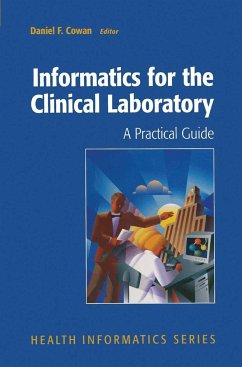This book will highlight all aspects of laboratory informatics, with a focus on information management and the corresponding hardware and technical processes involved. In addition to a comprehensive introduction on laboratory informatics, the book emphasizes the importance of information and resource management as opposed to simply covering the role of computers that support the information system. As a Professor of Pathology and the Director of Laboratory Information Services at the University of Texas Medical Branch at Galveston, Dr. Cowan has witnessed the shift in focus in the laboratory from the information generation to information management, and increasing resource limitations demand a higher level of management precision than can be gained from manual methods. The American Board of Pathology now requires an increasing sophistication in information management from candidates for certification. Thus, this book is intended for pathologists and residents in pathology, clinical laboratory scientists, and laboratory and information managers.
Following the broad-based introduction on laboratory informatics, the book's topics include:
- computer basics
- development and validation of the laboratory information system
- computer networks
- security and confidentiality on computer systems and networks
- total cost of ownership
- essential software
- interfaces
- process modeling
- artificial intelligence and expert systems
- bar coding in the laboratory
- image analysis and computer-assisted quantitation
- and telepathology.
This series is directed to healthcare professionals who are leading the tra- formation of health care by using information and knowledge. Launched in 1988 as Computers in Health Care, the series offers a broad range of titles: some addressed to specific professions such as nursing, medicine, and health administration; others to special areas of practice such as trauma and radi- ogy. Still other books in the series focus on interdisciplinary issues, such as the computer-based patient record, electronic health records, and networked healthcare systems. Renamed Health Informatics in 1998 to reflect the rapid evolution in the discipline now known as health informatics, the series will continue to add titles that contribute to the evolution of the field. In the series, eminent - perts, serving as editors or authors, offer their accounts of innovations in health informatics. Increasingly, these accounts go beyond hardware and so- ware to address the role of information in influencing the transformation of healthcare delivery systems around the world. The series also increasingly focuses on "peopleware" and the organizational, behavioral, and societal changes that accompany the diffusion of information technology in health services environments.
Hinweis: Dieser Artikel kann nur an eine deutsche Lieferadresse ausgeliefert werden.
Following the broad-based introduction on laboratory informatics, the book's topics include:
- computer basics
- development and validation of the laboratory information system
- computer networks
- security and confidentiality on computer systems and networks
- total cost of ownership
- essential software
- interfaces
- process modeling
- artificial intelligence and expert systems
- bar coding in the laboratory
- image analysis and computer-assisted quantitation
- and telepathology.
This series is directed to healthcare professionals who are leading the tra- formation of health care by using information and knowledge. Launched in 1988 as Computers in Health Care, the series offers a broad range of titles: some addressed to specific professions such as nursing, medicine, and health administration; others to special areas of practice such as trauma and radi- ogy. Still other books in the series focus on interdisciplinary issues, such as the computer-based patient record, electronic health records, and networked healthcare systems. Renamed Health Informatics in 1998 to reflect the rapid evolution in the discipline now known as health informatics, the series will continue to add titles that contribute to the evolution of the field. In the series, eminent - perts, serving as editors or authors, offer their accounts of innovations in health informatics. Increasingly, these accounts go beyond hardware and so- ware to address the role of information in influencing the transformation of healthcare delivery systems around the world. The series also increasingly focuses on "peopleware" and the organizational, behavioral, and societal changes that accompany the diffusion of information technology in health services environments.
Hinweis: Dieser Artikel kann nur an eine deutsche Lieferadresse ausgeliefert werden.










